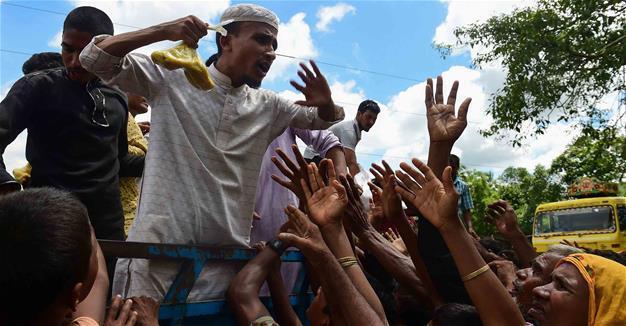UN seeks “massive” help for Rohingya fleeing Myanmar ‘ethnic cleansing’
 The United Nations appealed on Thursday for massive help for nearly 400,000 Muslims from Myanmar who have fled to Bangladesh, with concern growing that the number could keep rising, unless Myanmar ends what critics denounce as “ethnic cleansing”.
The United Nations appealed on Thursday for massive help for nearly 400,000 Muslims from Myanmar who have fled to Bangladesh, with concern growing that the number could keep rising, unless Myanmar ends what critics denounce as “ethnic cleansing”.The Rohingya are fleeing from a Myanmar military offensive in the western state of Rakhine that was triggered by a series of guerrilla attacks on Aug. 25 on security posts and an army camp in which about a dozen people were killed.
The United Nations has called for a massive intensification of relief operations to help the refugees, and a much bigger response from the international community.
“We urge the international community to step up humanitarian support and come up with help,” Mohammed Abdiker, director of operations and emergencies for the International Organization for Migration, told a news conference in the Bangladeshi capital. The need was “massive”, he added.
The violence in Rakhine and the exodus of refugees is the most pressing problem Nobel Peace laureate Aung San Suu Kyi has faced since becoming national leader last year.
U.N. Secretary-General Antonio Guterres and the U.N. Security Council on Wednesday urged Myanmar to end the violence, which he said was best described as ethnic cleansing.
The government of Buddhist-majority Myanmar rejects such accusations, saying it is targeting “terrorists”.
Numerous Rohingya villages in the north of Rakhine have been torched but authorities have denied that security forces or Buddhist civilians set the fires. They blame the insurgents, and say 30,000 non-Muslim villagers were also displaced.
Smoke was rising from at least five places on the Myanmar side of the border on Thursday, a Reuters reporter in Bangladesh said. It was not clear what was burning or who set the fires.
“Ethnic cleansing” is not recognized as an independent crime under international law, the U.N. Office on Genocide Prevention says, but it has been used in U.N. resolutions and acknowledged in judgments and indictments of the International Criminal Tribunal for the former Yugoslavia.
A U.N. panel of experts defined it as “rendering an area ethnically homogeneous by using force or intimidation to remove persons of given group.”
















